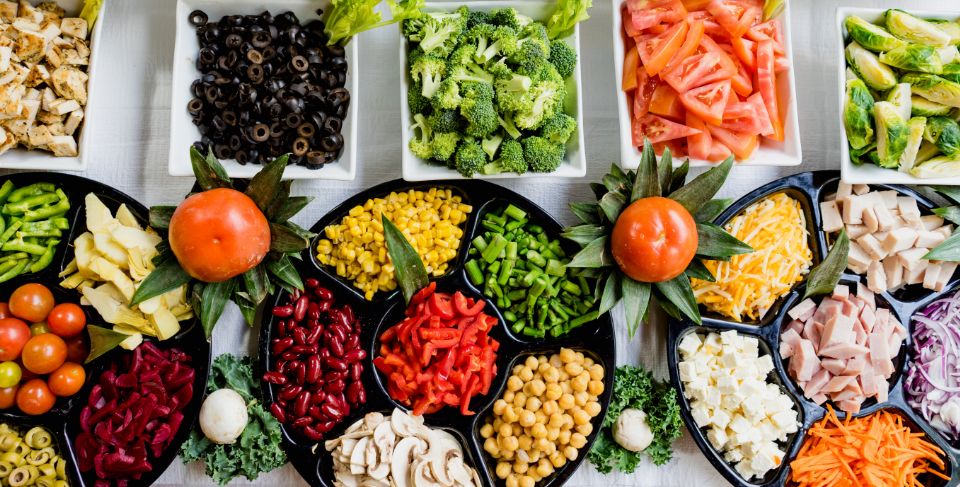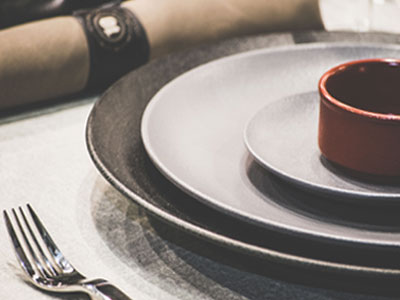Eating With Crohn's Disease

Written by Casey Hersch, MSW, LCSW
Diet matters and it heals
When I was diagnosed with Crohn's disease, I immersed myself in online research, checking books out at the library, talking to others with similar or the same condition. I expected I would find a solution that I could proceed with easily and swiftly. My inquiries and research opened a Pandora's box as there was so much information I hardly knew where to start.
There were plenty of articles about the condition and a number of people who were proposing dietary plans for helping the symptoms. Some people claimed changing the diet would cure the condition. I asked my GI doctor at the time if dietary changes would help Crohn's disease. He said, "Crohns disease is a genetic condition. Food has no impact on the condition. You can eat whatever you want and it won't change the progression of the disease." Now, grant it, this was over 10 years ago, much has changed in the research and understanding of Crohn's disease, but I was baffled;
How can a condition that involves digestion not be impacted by the foods I eat?
Fortunately I quickly realized that what we eat has a profound impact on the disease process and the gut.
I made changes to my diet and saw immediate improvements. Today, diet is at the core of my healing regimen.
I would have benefitted from dietary changes much earlier in my treatment but few of my physicians incorporated diet into my treatment plan. Many of them, in fact, told me that I could drink alcohol and eat pizza and it would have no impact on the disease. The mere thought of eating something that was rich and glutinous gave me pains in my stomach. I preferred bland and simple foods, they triggered less symptoms.
At the time of my diagnosis, I was struggling to drink water and digest small portions of baby food. I understood that if these simple ingredients were hard to swallow, then many foods had the potential to aggravate my sensitive gut. Malnutrition was also a problem...my small intestines, the source of the Crohn's disease and inflammation, were unable to properly absorb the nutrients from my food.
Intuitively I knew it made sense to eat nutrient dense foods in the easiest absorbable form.
Fortunately, once I became acquainted with holistic and integrative medicine, these healers and physicians embraced nutrition as part of whole body healing. My first encounter with treating my symptoms with diet involved the YEAST CONNECTION by William G. Crook. I adopted this diet when a holistic physician diagnosed me with Candida or Yeast--a result of decades of antibiotic use. I felt much better while on the diet. This confirmed the benefits and set me on a course prioritizing what I feed my body.
Listen to your body and make food choices that don't aggravate your symptoms
 Through the years food has been a vital part of my treatment and I have made many changes to support the healing of my gut and its digestion. These changes have ebbed and flowed with my body's sensitivities and transformation. Diet is not about "everything I WANT to eat," but instead what causes me the least amount of symptoms, incorporates balance, soothes and heals my gut lining, is nutritionally rich, and easily digested.
Through the years food has been a vital part of my treatment and I have made many changes to support the healing of my gut and its digestion. These changes have ebbed and flowed with my body's sensitivities and transformation. Diet is not about "everything I WANT to eat," but instead what causes me the least amount of symptoms, incorporates balance, soothes and heals my gut lining, is nutritionally rich, and easily digested.
Some diet choices have been constant for the past few decades and will never change: I eliminated all gluten, dairy, refined sugars, and all artificial sweeteners, food colors, and additives/preservatives. In short, if I read the ingredients on a label and I do not recognize their origins, I will not buy it. I also choose to eat organic.
This was a gradual process as I had not eaten organic prior to the Crohn's disease diagnosis, so it involved a lifestyle change and learning where and how to grocery shop. Knowing my gut was fragile, it was easy to eliminate dairy. I had sensed through the years I was lactose intolerant. I didn't feel well after milk or ice cream so I stopped eating things I knew made me feel poorly. It wasn't worth the side effects. Much of my research described the negative impact of gluten on the gut so I adopted a gluten-free lifestyle. I prioritized food choices that were the most absorbable and gave me the least struggles in breaking down/digesting to extract nutrients. This meant I eliminated whole seeds and drank bone broth. Sometimes I puree my food and I eat few raw vegetables (steamed is easier for me to digest). Organic minimizes my consumption of pesticides-- keeping toxins out of my body as much as I can control, is a priority. If you know what you are eating then you have some ownership over your body.
It is possible to eat well with dietary restrictions
At the time, while gluten- free made sense to me, it was still quite new in the market and therefore, gluten free alternatives were the exception not the rule. It was painful as my mom and I tried to modify recipes, including bread. Gluten- free alternatives were markedly more expensive than conventional foods and so one either had to endure the price or find a way to make things on your own. Fortunately, the availability of gluten-free food choices and education about the benefits is practically mainstream in 2019. The struggle I had when first diagnosed barely exists. In fact, people choose, without medical conditions, to be gluten- free, and they can frequent most supermarkets or restaurants, mainstream or otherwise, and find something suitable. Additionally, there are many foods targeting specific food allergies, cultural preferences, and tastes!
Diet is not a one-size-fits all: Find what works for you
There are some ongoing challenges: The increased focus on health, fitness, nutrition, weight loss, and autoimmune conditions, has led to a rise in the number of diets available targeted to relieve symptoms and improve medical conditions. To date, in my opinion there are an overwhelming number of diets that claim to help with medical conditions--many of these are specific to Crohn's disease or Inflammatory Bowel Disease. Some people claim they "cure" these conditions. While diet is one important aspect of healing, it can be confusing, especially when a diet doesn't lead to results for some people. Sometimes it is a unique combination of many diets to find the right fit for one's body.
Many of the diets I tried, specific to Crohn's disease, included a number of foods that my body could not tolerate. For example, I don't tolerate tomatoes, garlic, onions, corn, and nuts. Many diets include some version of recipes with these ingredients. Mushrooms, a mold, do not agree with my system nor do acidic fruits. Painfully I reviewed the assortment of trending diet and nutrition books, tried to follow these recommendations, with the hope that if I could find the right combination of food my symptoms would resolve themselves. This was in fact not true.
There is no one- size- fits all food option for people with autoimmune disease and digestive problems.
Each human body is different and each human body has a threshold of tolerance for various foods. I found the diets available to be frustrating and tedious as each one required a substantial lifestyle change and I was usually too weak or burnt out to take it on. Over time I came to find, through my own trial and error, not through what others told me, what I could tolerate and created a diet for myself that sustained me, kept my weight stable, and gave me energy. This process came from my own observations of how food made me feel, food allergy testing via blood (which I found to be much more useful than other allergy tests), and holistic approaches.
NAET and food allergy testing help me make positive choices for my gut
NAET, Nambudripad's Allergy Elimination Technique, identifies foods and toxins that are not balanced to the body--or cause reactions. Treatments reduce sensitivities and because of NAET, my food options expanded AND my food allergies decreased. This approach, coupled with my own observations and experiences, and food allergy testing allowed me to take ownership of my diet and see positive results from food choices that worked with my body rather than against it. People ask me all the time, what I think they should eat. I would not recommend my diet to another person. I would suggest they highly consider the benefits of gluten and dairy free and eating organic, clean, nutritionally rich whole foods, but beyond this, it is an individual process of self exploration. There are certain nutrients that people with Crohn's disease can be lacking.
Discussing with a physician how to properly identify the deficiencies is desirable. In my case, I eat foods rich in iron, zinc, magnesium, and take quality supplements. I eat a lot of ground beef and brown rice---this is not for everyone. Others may not fare so well with meat or any form of grain. Others might not believe in eating meat or beef in particular. It is an individual process.
Our bodies know more than we give them credit for:
I recall one day exploring bone broth and noticing on the ingredients list it named tomatoes and onions. I don't tolerate onions or tomatoes, but I wanted to try the bone broth which I know is healing. I asked a peer who specializes in nutrition if she thought the broth would be ok for me--perhaps tomatoes and onions when cooked down into a broth would not be a problem? She appropriately responded,
"I don't know. Try a small sample and see how it makes you feel. Have you had any life threatening reactions in the past to tomatoes and/or onions (my answer was no)? How can I tell you what you should eat or what is best for your body?"
This seemed so basic, common sense really, but my fear of having a life threatening allergic reaction loomed over me so much, I forgot that my body can give me information to help me decide if something is ok to eat. Sure enough I drank a small bit of the broth and immediately felt symptoms. I listened. While not my only method of determining the right diet for myself, I incorporate my own relationship with my body along with other techniques to help me figure out what I should and should not eat.
Our bodies are designed to extract what we need from food. We resonate with certain foods and not so much with others, which is why we all like different things. When you pick up a piece of fruit if you pay attention you will get the urge to eat it right away if it resonates with you, versus leaving something in the refrigerator for days because it does not sound good. For months I was very low in iron and I never made the connection that I was eating raisins by the pounds. Raisins are high in iron. Why was I craving raisins? My body knew I needed the iron and so I was drawn to the raisins.
In summary---there may be many diets available to us---but only YOU will know better than anyone else which diet is the best for you and your body. Knowing this provides a solid foundation from which to proceed and sift through the abundance of information available.